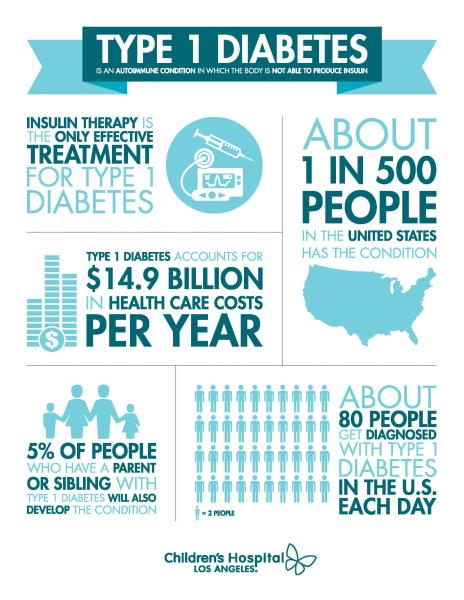
Symptoms, Treatment and Prevention of Type 1 Diabetes

Written by Roshanak Monzavi, MD, assistant professor and director of Fellowship, Center for Endocrinology, Diabetes and Metabolism at Children’s Hospital Los Angeles
Diabetes mellitus is a group of conditions in which a person has high glucose (sugar), either because the body cannot make enough insulin to store glucose, or because it cannot utilize the produced insulin adequately. Most people who have diabetes have type 2 diabetes, when the body cannot utilize the insulin very well. However, while it is less common, as many as 1 in 500 people have type 1 diabetes (T1D). Most children who are diagnosed with diabetes have T1D.
T1D is an autoimmune condition. The body’s immune system attacks the insulin-producing cells (beta cells) in the pancreas by mistake and destroys them. As these cells get destroyed and cannot produce sufficient insulin, the person with T1D develops high glucose in the blood. A person with T1D can eventually get sick and dehydrated if not diagnosed in a timely manner.
Symptoms of type 1 diabetes

The classic symptoms of T1D are:
- Increased urination
- Thirst
- Unexplained weight loss
- Lack of energy
If symptoms continue without diagnosis and therapy, a person with T1D can develop:
- Vomiting
- Abdominal pain
- Problems breathing
Treatment
The main treatment for T1D is insulin, either by injections or through an insulin pump. Since insulin is a protein, it cannot be given in the form of a tablet or liquid syrup by mouth, as the digestive enzymes in the stomach will break it down and it will not be effective by the time it is absorbed in the blood. People with T1D need to learn how to calculate their carbohydrate intake and how to check their glucose level. They also need to learn how to calculate the insulin dose they need each time based on their glucose level and carbohydrate intake. Typically, people with T1D check their glucose level five to seven times a day and give insulin injections four to seven times a day, depending on glucose levels and frequency of eating. Patients need to follow up with their endocrinologist every three months and work closely with their diabetes team (nurse, dietitian and social worker).
Prevention
Currently there are no known therapies that can alter the immune system, prevent it from destroying beta cells, and hence prevent T1D. However, there are many researchers nationally and internationally who are looking at immunomodulators, which are medications that can alter the immune system, to try to prevent T1D.
TrialNet is an international network of researchers who are exploring ways to prevent, delay and reverse the progression of type 1 diabetes. TrialNet’s main areas of research are screening family members of people with T1D to assess their risk for developing T1D, and evaluating the efficacy of immunomodulators in preventing T1D in at risk individuals and slowing the progression of T1D in recently diagnosed people. The TrialNet team here at CHLA performs more than 300 screenings of family members every year. We also participate in three prevention trials for family members whose screening results suggest they have a high risk of developing T1D.


